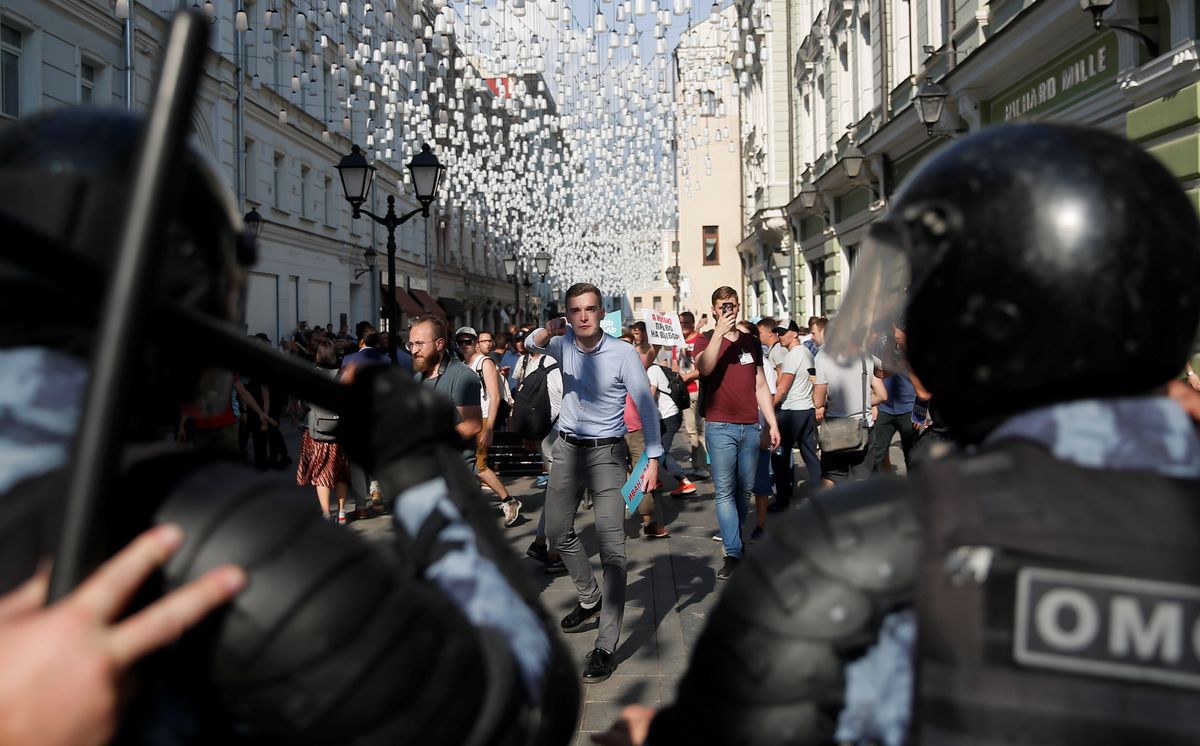The most consequential story in international politics right now is the sheer number of potentially consequential stories. Here are ten of them.
The US-China Trade War: Fed up with a lack of progress in negotiations, President Trump announced new tariffs on more Chinese goods. Beijing, with one eye on the US electoral map, responded by telling its state-run companies to stop buying from US farmers and then allowed traders to push the Chinese currency to a worrying new low. Markets quaked.
Fury in Kashmir: On Monday, India revoked the partial autonomy of the Indian-controlled sector of the disputed province of Kashmir. Pakistan, which controls the rest of the territory, denounced the move as illegal and downgraded relations. Large numbers of Kashmiris, some of whom fear that India wants to alter the region's demographic balance, took to the streets in protest, and hundreds were arrested. This heavily militarized territory has suffered from war, insurgent violence, and terrorism—and the political temperature has just gone up. As of this writing, landline connections, internet and mobile coverage are suspended inside Kashmir, and tens of thousands of additional Indian troops there.
Hong Kong Showdown: There is no clear off-ramp for the continuing conflict between Hong Kong's pro-democracy protesters and the city's Beijing-backed government. China has warned its troops will intervene to restore order if necessary. Hundreds of thousands of Hong Kongers responded with the city's first general strike in 50 years. Street protests continue, and on Monday, police reportedly fired nearly as many rounds of tear gas as they did during the entire months of June and July. At this point, it's not clear that conciliatory gestures from Beijing would ease tensions.
An Ebola Emergency: The spread of the Ebola virus inside the Democratic Republic of Congo appears to be accelerating, according to the World Health Organization officials. Save the Children, a relief organization, reports that Ebola has killed more than 500 children in that country. Last week, the government of Rwanda briefly closed its border with the DRC, where there have been at least four reported cases of the highly contagious virus in Goma, a border city of more than one million people and a major regional travel hub.
US-Iran Enmity: Iran reported on Monday that its navy had seized another foreign ship in the Persian Gulf, this one an Iraqi vessel. This is the latest confrontation near the Strait of Hormuz, the narrow passageway through which one-quarter of the world's traded oil passes each day. It's also a reminder that Iran's frustration with US sanctions continues to grow. The US accused Iran this week of jamming the GPS systems onboard passing ships to fool them into drifting into Iranian waters. The US and Iran have each said they want to talk but can't agree on where to begin.
North Korean Warning Shots: A new UN report claims that North Korea has used cyberattacks on banks and cryptocurrency exchanges to earn $2 billion for weapons. To protest US-South Korean military exercises, North Korea has test-fired four short-range missiles in the past two weeks and warns that it's considering a "new road," presumably one that leads away from the progress Trump and Kim have claimed in nuclear negotiations. President Trump says the missile tests are not alarming because the weapons could not reach the US mainland. But they could reach US allies, say South Korean and Japanese officials.
An Embargo of Venezuela: The US government has announced sweeping new sanctions against the Venezuelan government of Nicolas Maduro, aimed not only at Venezuelan government assets in the US but also at countries, companies, and individuals who do business with it. The goal is to deprive of Maduro of support from Russia and China, and opposition leader Juan Guaidó, recognized by the US and many other countries as Venezuela's legitimate president, applauded the move. The sanctions are likely to add to the hardship of a people already in economic crisis.
A Moscow Crackdown: In Russia's capital, police have arrested nearly 3,000 people this summer during demonstrations that began as protests against the exclusion of opposition candidates in Moscow's upcoming municipal elections. But despite a demonstrated willingness by police to rough up demonstrators, another protest rally is planned for this weekend. In 40 other Russian cities, supporters of often-jailed opposition activist Alexei Navalny, who may have been poisoned earlier this summer, have announced "pickets in solidarity with Moscow."
A Brexit Crash: UK Prime Minister Boris Johnson says Britain will leave the European Union, with or without a deal on the future UK-EU relationship, by October 31. A no-deal Brexit poses serious economic risks for both sides. What if Labour Party leader Jeremy Corbyn calls a no-confidence vote, triggering a two-week process in which parliament must form an alternative majority to prevent an early election? Leaked comments from Johnson advisor Dominic Cummings signal that, even if an alternative majority becomes apparent, the prime minister could refuse to resign… and call an election to be held after October 31. Imagine the resulting chaos.
American Political Violence: Bitterness between President Trump and Democrats—and their respective supporters—is intensifying. One of this week's two mass shootings—in El Paso, Texas—was explicitly political. It appears the man who murdered 20 people there had minutes before posted an online protest against a "Hispanic invasion of Texas." Democrats were quick to point out Trump's repeated use of the word "invasion" to describe illegal immigration at the nearby US-Mexican border. Trump supporters accuse Democrats of exploiting mass murder for political gain. The US now moves toward an election year with the risk of further political violence on the rise.
The bottom line: None of these stories is fated to end in disaster for those exposed to them. But all of them look to be moving in the wrong direction.



















